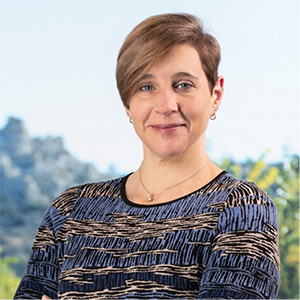Cari F. Herrmann Abell

Now, here, you see, it takes all the running you can do, to keep in the same place. If you want to get somewhere else, you must run at least twice as fast as that!
~— The Queen of Hearts
Bio
Senior Research Scientist and Staff Advocate
Cari Herrmann Abell joined BSCS as a research scientist in December 2018. Before joining BSCS, she was a senior research associate at AAAS Project 2061. Her work focuses on the research and development of curriculum and assessment resources aligned to K-12 science learning goals. Cari has served as the principal investigator on two measurement grants funded by the U.S. Dept. of Education’s Institute of Education Sciences that focused on developing instruments to assess students’ progress on the energy concept (ASPECt). She also contributed to the development of two curriculum units now available through NSTA press, Toward High School Biology and Matter and Energy for Growth and Activity.
Cari received her Ph.D. in chemistry from the University of North Carolina at Chapel Hill and her B.S. in chemistry and mathematics from Muhlenberg College in Allentown, PA. She currently lives in the DC metro area and spends her spare time teaching fitness classes and leading her daughters’ Girl Scout troops.
Selected Publications
Recent Peer Reviewed Publications and Book Chapters:
Herrmann Abell, C.F. & DeBoer, G.E. (2018). Investigating a Learning Progression for Energy Ideas from Upper Elementary Through High School. Journal of Research in Science Teaching, 55(1), 68-93 DOI: 10.1002/tea.21411.
Roseman, J.E., Herrmann-Abell, C.F., & Koppal, M. (2017). Designing for the Next Generation Science Standards: Educative Curriculum Materials and Measures of Teacher Knowledge. Journal of Science Teacher Education, 28(1), 111-141. DOI: 10.1080/1046560X.2016.1277598.
Herrmann Abell, C.F., Koppal, M., & Roseman, J.E. (2016). Toward High School Biology: Helping Middle School Students Understand Chemical Reactions and Conservation of Mass in Non-Living and Living Systems. CBE-Life Science Education. 15(4), ar74. DOI: 10.1187/cbe.16-03-0112.
DeBoer, G. E., Quellmalz, E. S., Davenport, J. L., Timms, M. J., Herrmann-Abell, C. F., Buckley, B. C., Jordan, K. A., Huang, C.-W., and Flanagan, J. C. (2014), Comparing three online testing modalities: Using static, active, and interactive online testing modalities to assess middle school students’ understanding of fundamental ideas and use of inquiry skills related to ecosystems. Journal of Research in Science Teaching. 51(4) 523-554 DOI: 10.1002/tea.21145.
Herrmann-Abell, C.F., & DeBoer, G.E. (2014). Developing and Using Distractor-Driven Multiple-Choice Assessments Aligned to Ideas About Energy Forms, Transformation, Transfer, and Conservation. In R. F. Chen, A. Eisenkraft, D. Fortus, J. Krajcik, K. Neumann, J. Nordine & A. Scheff (Eds.), Teaching and Learning of Energy in K – 12 Education (pp. 103-133): Springer International Publishing.
Herrmann-Abell, C.F., & DeBoer, G.E. (2011). “Using distractor-driven standards-based multiple-choice assessments and Rasch modeling to investigate hierarchies of chemistry misconceptions and detect structural problems with individual items,” Chemical Education Research and Practice, 12, 184-192. DOI: 10.1039/C1RP90023D.
DeBoer, G.E., Herrmann-Abell, C.F., Gogos, A., Michiels, A., Regan, T.J., Wilson, P. (2008). Assessment Linked to Science Learning Goals: Probing Student Thinking Through Assessment in J. Coffey, R. Douglas, and C. Stearns (Eds.), Assessing Science Learning: Perspectives from research and practice, (pg. 231-252): NSTA Press.